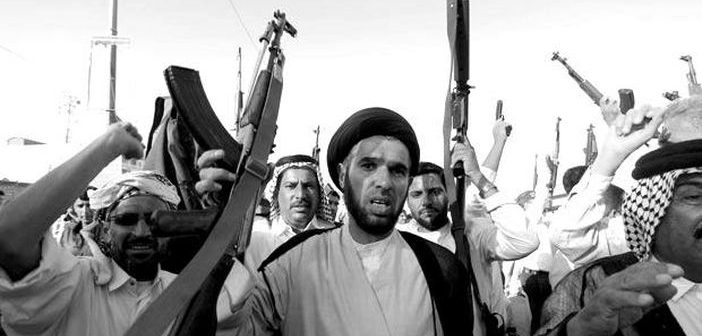Iraq is known around the world as the cradle of civilization despite of the various political coups in this country’s history since 1958 when the Monarchy was ended by the murder of the Royal family. The country was then lead by an Iraqi “Free Officers” group, which was inspired by the successful take-over of power in Egypt in 1952. The Hashemite Royal family was supported by the United Kingdom; therefore, terminating them was an essential point for the coup movement to make sure they would not regain power with the help of the British.
After the Hashemites were killed and expelled from Iraq, the country lived in continuous political struggles and coup movements until 1979.
The Iraqi Baathist Saddam Hussein came to power in 1979 and he was known by many as a tyrant and a dictator. However, Iraq was moving forward on all levels in spite of the war fought with Iran during eight years. The Iraqi people had free education and health care and even during the sanction period of 1990-2003 every single Iraqi family had monthly food stamps.
Despite the mass destruction of the Iraqi infrastructure because of the air strikes by the allies in the second gulf war, the Iraqi government could bring the infrastructure back to a working state, all by itself (most notably with the help of its vast oil reserves). Iraq could still export oil with the help of Syria and thus bypassing the embargo. The Iraqi people were united during Saddam Hussein’s regime and not ethnically divided as nowadays. Secularism was enforced, sometimes ruthlessly.
Iran, the biggest enemy of Iraq in the region, tried to control this rich country during eight years of war in 1980-1988. Iraq was the aggressor of the confrontation, but after successes in the first years, they were pushed back rapidly.
With Western aid, the Iraqi Army stood against the Iranian counterattacks which devastated their oil fields and was able to bring Iran to the table of negotiations and end the war on August 8th 1988 after years of a devastating war that cost both sides billions of dollars and thousands of lives. However, Iran’s pretentiousness to control this country is old and dates back throughout history, so the end of the war was never an end for their desire but a little break waiting for the right moment before attacking again.
Saddam Hussein was a Sunni ruling a Shiite majority country, which Iran tried to influence and destabilize. The Iraq-Iran rivalry continues until today.
Iraq was an independent and strong country compared to other countries in the Middle East before the American invasion of the country in 2003. Although it was ruled by a brutal dictatorship, the socialist government model (with the help of oil revenues) helped many citizens.
President Bush and his administration claimed that Saddam Hussein had ties with Al Qaeda and that he was building nuclear bombs behind the watchful eyes of the UN monitoring teams. Under false pretexts, the country was invaded and the infrastructure was destroyed, but not even a single piece of evidence was found by the American troops to justify their claims.
After this intervention, Bush assigned Paul Bremer as a civil governor for Iraq after toppling the regime to help establish a new government by the Iraqis. This man actually did nothing but made matters even worse in this country. The dismantlement of the armed forces, and the government had its consequence and helped thugs and corrupt politicians come to power. Without an adequate Iraqi police-force, lawlessness appeared on the streets, and space was given to Islamic fundamentalists.
For periods during the American occupation the country was on the verge of civil wars, between Sunnis, Shiites and Kurds.
Iraq, before 2003 was an independent country… and the fight was one from the inside to the outside, to defend the country.
Now, because of the corrupted political parties in power and the influence of both Iran and some other foreign forces, the country is weakened and shattered on all levels one could think of. The people are ethnically divided by the corrupt politicians because that is the only way for them to stay longer in power and to get richer.
Iraq has one of the most important oil-reserves in the middle-east, and people on top are still profiting from it, at the expense of the average civilians. The Kurds in the north do not feel they belong to Iraq and have separatist tendencies and the only thing that keeps them attached to this country is the need for the financial support from the Iraqi government. To be precise they are economically attached to Iraq and they cannot declare independence unless they become economically independent first. They even have a formidable army with the Peshmerga.
Even after the war against Islamic State is over, questions will remain about the unity of the country.
The Sunnis and the Shiites in the middle and the south of the country still have no intentions to trust each other and the accusations flying from one side to the other are not going to end soon. Even now we can see the capital Baghdad getting divided along sectarian lines. Will the reconciliation be possible? With weekly suicide bombings…
Disaster is the result after fourteen years of an invasion supposed to free the Iraqis from the tyrant Saddam and give them a better life. Tens of thousands of lives wasted, billions of dollars taken to the unknown and thousands of Iraqis live below the poverty line in a country, which was considered as one of the richest countries in the middle east.
Iraq is divided and the government has no control over the streets; but the Shia and Kurdish militias do.
People still have no freedom of speech and if they raise their voice, they get killed.
Anything else: Iraq is definitively a “broken state”.



